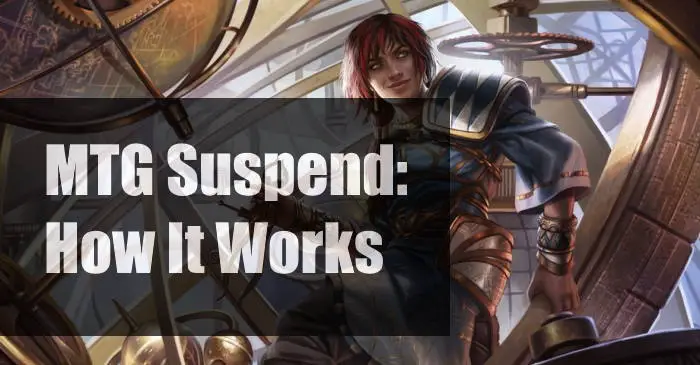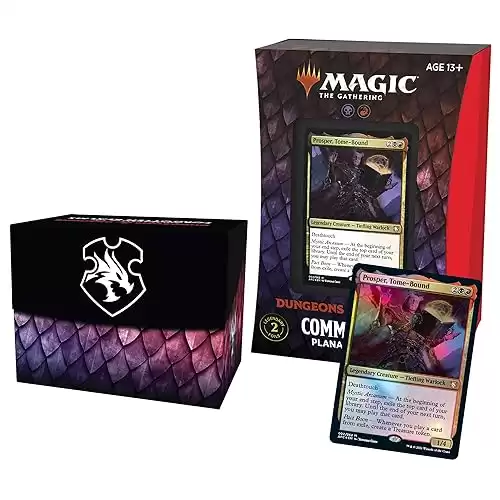There are many complex mechanics in MTG. Suspend, for example, has a lot of niche rules and interactions that can make it difficult to fully understand. The idea of delaying your spell is simple enough, but how does it actually work?
If you have a card with suspend in your hand and you could cast it normally, you can pay its suspend cost instead. To do this, exile the card with N time counters on it (if a card has Suspend 2, for example, N = 2), and remove a time counter on each of your following upkeeps. Once the last counter is removed, you must cast the spell without paying its mana cost.
These steps are easy enough to follow, but they create a lot of questions. When can you pay a suspend cost? Do counterspells work against suspend? Is this mechanic even worth using? The rest of this article will explain common questions around suspend, as well as provide suggestions on how to build a suspend deck in commander
Table Of Contents:
- MTG Suspend Pros and Cons
- What Does Suspend Mean In MTG?
- Is MTG Suspend Good?
- Can You Make A Suspend Commander Deck?
- Conclusion
MTG Suspend Pros and Cons
| Pros | Cons |
| Cheap mana cost | Costs you turns waiting |
| Lets you set up a big turn | Give your opponents information |
| Good in the early game | Bad in the late game |
What Does Suspend Mean in MTG?
As we’ve seen, suspend lets you delay a spell for later in the game, but how does each step of this process work? And when can you or your opponents interact with it? Below is a list answering the most common questions about suspend in MTG.
Do You Have to Reveal Suspended Cards?
Yes. When you suspend a card, you exile it face up. Your opponents can always read the card and know how many time counters it has left. This is one of the downsides to suspend: your opponent not only gets free information, but they also have time to react to it.
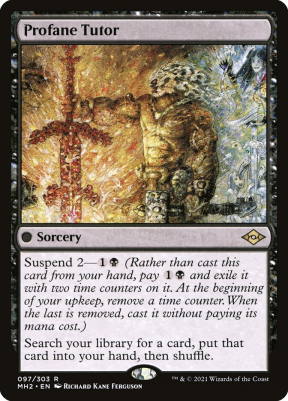
Thankfully, it’s pretty difficult to interact with suspended cards. There aren’t many effects that interact with exile, and they don’t see a ton of play. Your opponent also can’t use proliferate to add extra time counters, since proliferate only works against players and permanents. Still, giving your opponent too much information is always risky.
Is MTG Suspend Instant Speed?
Sometimes. You can only suspend a card from your hand if you have priority and could cast it normally, so the usual timing restrictions apply. At time of writing, there are no suspend cards that are instants or have flash. This means that without any extra effects, you can only suspend cards at sorcery speed.
If you can give your cards flash, however, then you can suspend them at instant speed. Vedalken Orrery, for example, would let you suspend a card on the end step before your turn. This interaction may have its uses, but the main benefit of flash is surprising your opponents. Unless the card had suspend 1, your opponents would still have at least a full turn cycle to plan around it. Sometimes, the extra turn will make a big difference, but other times your opponents will still make use of the information.
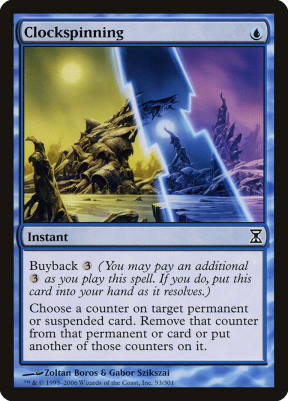
Once the card has been suspended, it gets cast whenever it loses its last time counter. Usually, this will be in your upkeep, but Clockspinning can make this happen in any phase. This means that spells which would normally be restricted to sorcery speed can be cast at instant speed. You could use Clockspinning to get a surprise blocker after an opponent declared attackers, or unexpectedly remove one of their creatures.
In short: follow the usual time restrictions when you suspend a card and ignore them once it loses its last time counter.
Can Your Opponent Stop You from Suspending a Card?
Yes. In order to suspend a card, you have to be able to cast it. If your opponent can make it so that you wouldn’t be able to cast the card, you also can’t suspend it. This means that if your opponent controlled a Ward of Bones, you might not be able to use suspend.
The same is true for casting a suspended card. If your opponent had given you control of a Steel Golem, you wouldn’t be able to cast your Deep-Sea Kraken after removing its last time counter. If you fail to cast a suspended card, it remains in exile until an effect moves it to a different zone. Suspend won’t let you cast it from exile again.
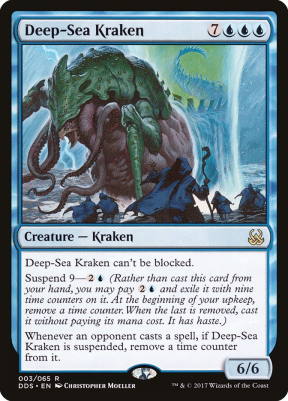
Does MTG Suspend Go on the Stack? And Can You Counter Suspend?
No. But also yes. Let me explain: the initial suspend ability is a special action. This means that it doesn’t use the stack, so you and your opponents can’t respond to it. However, once the last time counter is removed, then you cast the spell without paying its mana cost and put it onto the stack. Now you and your opponents can respond, which means this is their chance to counter it.
You can also respond with any number of effects. You could copy an Ancestral Vision, for example, which seems particularly strong.
RELATED: What Is The Stack In MTG & How Does It Work?
Is Suspend an Alternative Casting Cost?
Just like the last question: no, but also yes. Using a special ability isn’t an alternative casting cost. Remember, you aren’t casting a card when you suspend it. Once you cast the spell for free, though, it is an alternative casting cost. This is important for suspend cards without a mana cost, like the previously mentioned Ancestral Vision. You can’t cast these spells normally, so you have to find an alternative casting cost, like suspend, to get them on the stack.
Do I Have to Pay Additional Costs with Suspend?
Yes. If you wanted to target your opponent’s Terror of the Peaks, for example, you would have to pay the additional three life. This gets a little more complicated when it comes to paying additional mana, though.
“Suspend forces you to play the spell and pay the costs… but it doesn’t force you to tap your lands for mana.”
Mark Gottlieb – “Too Cool For Rules”
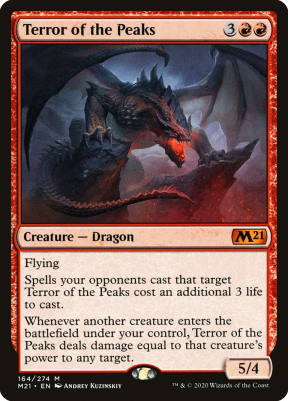
If you happen to have floating mana, perhaps from a Braid of Fire, then you’ll have to pay. If you don’t, then you can choose not to tap your lands and fail to cast the spell.
Is MTG Suspend Good?
Now that we’ve gone over the nuts and bolts of suspend, is it worth using? There are many strong mechanics and designs in MTG, so suspend has a lot to compete with. It has plenty of advantages, but do the disadvantages outweigh them? This next section will show you how to evaluate which suspend cards are worth a slot in your deck.
Do You Get a Big Advantage from Suspending?
When considering a suspend card for your deck, you should look at what you gain from suspending it. We’ve already analyzed that you give your opponents information when you suspend a card. You also have to wait multiple turns to get the effect. If you’re not getting a serious discount on mana, or you have to wait too long, then it might not be worth it to run certain suspend cards.
Most cards are pretty cheap to suspend, often costing only one or two mana. These are great in your opening hand, since most decks don’t have turn one plays anyway. In the early parts of the middle game, you might have enough mana to suspend a card here or there, and you’ll usually see it before the game closes out. Beyond this, it’s difficult to justify suspending most cards.
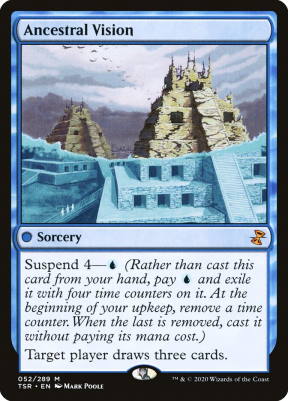
If a card makes you wait three or more turns to cast it, you run the risk of falling behind on
Ultimately, you can get some value from suspend if the cost is cheap enough (for both mana and turns), but suspending a card falls off as the game goes long.
Are The Effects Worth It?
Of course, you should only run cards that you’d want whether they have suspend or not. If the effect isn’t worth running, suspend won’t fix the card.
This is where we see the biggest problem: many suspend cards are just decent creatures. A 3/3 flyer or a 4/1 with first strike might be solid in limited, but the bar is a lot higher in constructed formats. Other than the ability to suspend them in the early game, most of these cards don’t offer anything extraordinary.
There is a cycle of suspend cards that give you value the longer they’re in exile. Each has X in its suspend cost and provides an effect whenever a time counter is removed from it. For example, Aeon Chronicler draws you extra cards.
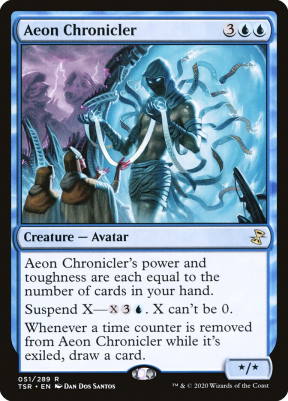
These cards just make me wonder: why not cast Mind Spring? Or Exsanguinate? Or whatever the equivalent card is? The cycle isn’t more efficient than its competition, and it doesn’t give you the full effect right away. They also encourage you to pump lots of mana into them, but you have the most mana later in the game when you won’t see as many turns go by.
Final Thoughts On MTG Suspend
There are some cards with suspend that are worth running. Search for Tomorrow is efficient whether you cast it or suspend it. Your opponents also can’t really play around it like they could if it were a
For most decks, though, there are better options throughout the history of MTG than suspend cards that were designed for limited (which is the majority of them). Carefully consider the value of the card’s effect, and make sure you don’t put yourself too far behind by suspending it.
Can You Make a Suspend Deck in Commander?
Even it’s not the best mechanic in MTG, suspend is still a fun and flavorful ability. You could include suspend as a subtheme in your next EDH deck, or you could build around it entirely. If you’re interested in building a suspend commander deck, here are a few suggestions for who to run as your general.
Jhoira of the Ghitu
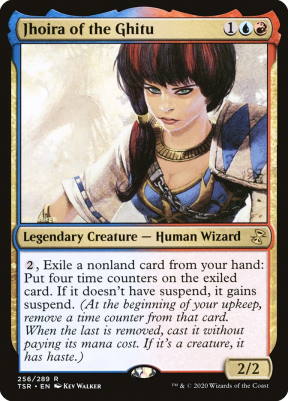
Jhoira is an interesting commander in this discussion because you might not play any suspend cards with her. Her ability to give any of your nonland cards suspend means you can play this deck however you want. You could cheat out whatever big spells you like best, or you could play some of the strongest haymakers in MTG history.
An eldrazi deck would be an interesting way to take Jhoira, and you can find more information on how to build that deck here: Building An Eldrazi Commander Deck: An Ultimate Guide.
Prosper, Tome-Bound
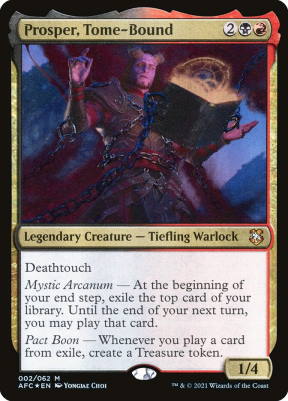
Suspend works quite well with Prosper’s ability. Most of your suspend cards will only cost you one or two mana, so getting a treasure from Prosper makes suspend even more efficient. Remember: the fewer turns a card is suspended for, the sooner you get the mana back to keep your engine going. Prosper’s precon might benefit from adding some more suspend cards.
RELATED: The Best Precon Commander Decks
Ranar, the Ever-Watchful
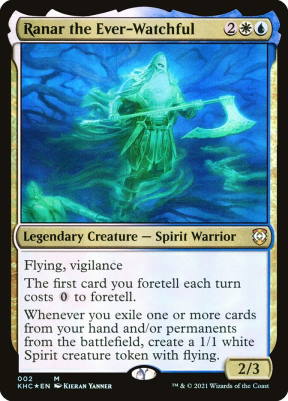
Unlike Prosper, Ranar gives you immediate value from suspending cards. You’ll likely want to keep the focus of this deck around foretell, but a few suspend cards could make a welcome addition.
Conclusion
Suspend may not be the strongest mechanic in MTG but suspend still has its benefits. Hopefully you have a better understanding around the rules of suspend. If you want to try playing this mechanic, don’t wait to put it in your next deck!
